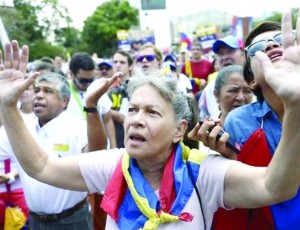
The political unrest in Venezuela has created quite a stir, but there is no plan by the government to bring Guyanese in the Spanish-speaking neighbouring country home, as they have made no such request.
Foreign Minister Carolyn Rodrigues-Birkett in a recent interview told Guyana Times International that the government is monitoring the situation through its embassy in Caracas.
Some 30,000 Guyanese are living in Venezuela, and their relatives in Guyana are concerned about their safety following weeks of opposition-led disturbance.
A few days ago, sister Caribbean Community (Caricom) nation Trinidad and Tobago airlifted its citizens in Venezuela, including embassy staff through Caribbean Airlines (CAL).
More than 50 persons have died in the massive political protests which started about two weeks ago. More than 500 persons have been charged and 50 have been jailed. Also, more than 150 persons have been injured.
The protest action was organised by Maria Corina Machado and Leopoldo López, leaders of Venezuela’s opposition, with support from a number of student movements.
According to reports, violation of civil rights, chronic scarcity of basic goods, and high levels of criminal violence are among the many reasons for the protests. The inflation rate for 2013 was tallied at 56.2 per cent and the scarcity index was near 20 per cent throughout 2013.
Two Venezuelans in Guyana, Anna Gomez and her 20-year-old daughter Lillian say thee feel the anguish of Venezuelans back home. They have been moving back and forth to Guyana for years. However, since coming here in early January, they have not set foot back to their home country. The truth is, they say, that they will not return until the “storm has passed”.
“Bed of roses”
Speaking with GTI on Thursday, they shared their glory days under the strict socialist ideologies of late President Hugo Chavez, contending that life then was considered “a bed of roses”, when compared to the current state of the country.
The death of Hugo Chavez in March 2013 had opened the door to black market traders and major exploitation. According to Gomez, importers took the opportunity to “rip off the people of Venezuela”.
“There was a little rumbling. The tension was growing; you couldn’t get a toilet paper. Flour which was supposed to be 16 Venezuelan Bolívar a pack was 100 Venezuelan Bolívar. Simple onions went up from 15 to 90 Venezuelan Bolivar, and so it was there… the tension was there and so I was not surprised when it erupted,” Gomez, speaking about the protest, said.
On April 14, 2013, one month after the President died, his former Vice President Nicolás Maduro was declared winner of the general elections; a narrow victory over leader of the main opposition party Henrique Capriles. But soon after, things took a radical turn for the worst. Hearts were broken and tears flowed. The country was overcast with uncertainty and fear. The women explained that the problem was not in the victory of Maduro, but in the fact that the government does little or nothing to curb the exploitation carried out by the black marketers.



